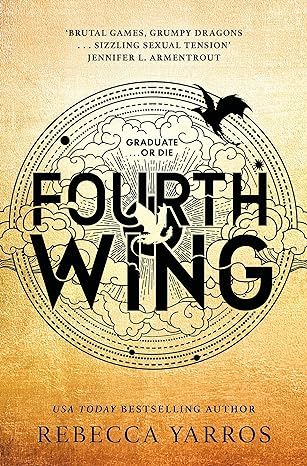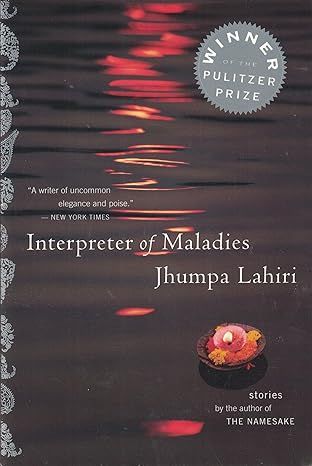Interpreter of Maladies
4.5
-
8,798 ratings
With a new Introduction from the author for the twentieth anniversary Winner of the Pulitzer Prize for fiction, this stunning debut collection unerring charts the emotional journeys of characters seeking love beyond the barriers of nations and generations. In stories that travel from India to America and back again, Lahiri speaks with universal eloquence to everyone who has ever felt like a foreigner.
The Das family is taking a vacation in India and hired Mr. Kapasi as their driver and tour guide. As the story begins, they wait by a tea stand in Mr. Kapasi's car. The parents debate over who should take Tina to the bathroom. Ultimately, Mrs. Das takes her reluctantly. Her daughter wants to hold her mother's hand, but Mrs. Das ignores her. Ronny leaves the car to see a goat. Mr. Das orders Bobby to look after his brother, but Bobby ignores his father.
The Das family are on their way to visit the Sun Temple in Konarak, India. Mr. Kapasi notices how young the parents look. Although the Das family looks Indian, their dress and manner are undoubtedly American. He chats with Mr. Das while they wait. Mr. Das's parents live in India, and the Dases come to visit them every few years. Mr. Das works as a science middle school teacher.
Tina returns without their mother. Mr. Das asks where she is, and Mr. Kapasi notices Mr. Das refers to her first name when speaking with Tina. Mrs. Das returns with puffed rice she bought from a vendor. Mr. Kapasi gives her a closer look, noticing her dress, figure, and legs. She sits in the back seat and eats her puffed rice without sharing. They continue towards their destination.
Kindle
$14.99
Available instantly
Audiobook
$0.00
with membership trial
Hardcover
$23.29
Paperback
$5.94
Ships from
Amazon.com
Payment
Secure transaction
ISBN-10
039592720X
ISBN-13
978-0395927205
Print length
198 pages
Language
English
Publisher
Mariner Books
Publication date
May 31, 1999
Dimensions
5.31 x 0.6 x 8 inches
Item weight
8.1 ounces
Popular Highlights in this book
Still, there are times I am bewildered by each mile I have traveled, each meal I have eaten, each person I have known, each room in which I have slept. As ordinary as it all appears, there are times when it is beyond my imagination.
Highlighted by 2,285 Kindle readers
In its own way this correspondence would fulfill his dream, of serving as an interpreter between nations.
Highlighted by 1,142 Kindle readers
Something happened when the house was dark. They were able to talk to each other again.
Highlighted by 1,101 Kindle readers
Product details
ASIN :
B003K16PBE
File size :
1927 KB
Text-to-speech :
Enabled
Screen reader :
Supported
Enhanced typesetting :
Enabled
X-Ray :
Enabled
Word wise :
Enabled
Award Winners:
Editorial Reviews
Mr. Kapasi, the protagonist of Jhumpa Lahiri's title story, would certainly have his work cut out for him if he were forced to interpret the maladies of all the characters in this eloquent debut collection. Take, for example, Shoba and Shukumar, the young couple in "A Temporary Matter" whose marriage is crumbling in the wake of a stillborn child. Or Miranda in "Sexy," who is involved in a hopeless affair with a married man. But Mr. Kapasi has problems enough of his own; in addition to his regular job working as an interpreter for a doctor who does not speak his patients' language, he also drives tourists to local sites of interest. His fare on this particular day is Mr. and Mrs. Das--first-generation Americans of Indian descent--and their children. During the course of the afternoon, Mr. Kapasi becomes enamored of Mrs. Das and then becomes her unwilling confidant when she reads too much into his profession. "I told you because of your talents," she informs him after divulging a startling secret.
I'm tired of feeling so terrible all the time. Eight years, Mr. Kapasi, I've been in pain eight years. I was hoping you could help me feel better; say the right thing. Suggest some kind of remedy.
Of course, Mr. Kapasi has no cure for what ails Mrs. Das--or himself. Lahiri's subtle, bittersweet ending is characteristic of the collection as a whole. Some of these nine tales are set in India, others in the United States, and most concern characters of Indian heritage. Yet the situations Lahiri's people face, from unhappy marriages to civil war, transcend ethnicity. As the narrator of the last story, "The Third and Final Continent," comments: "There are times I am bewildered by each mile I have traveled, each meal I have eaten, each person I have known, each room in which I have slept." In that single line Jhumpa Lahiri sums up a universal experience, one that applies to all who have grown up, left home, fallen in or out of love, and, above all, experienced what it means to be a foreigner, even within one's own family. --Alix Wilber
Sample
Chapter One
A Temporary Matter
The notice informed them that it was a temporary matter: for five days their electricity would be cut off for one hour, beginning at eight P.M. A line had gone down in the last snowstorm, and the repairmen were going to take advantage of the milder evenings to set it right. The work would affect only the houses on the quiet tree- lined street, within walking distance of a row of brick-faced stores and a trolley stop, where Shoba and Shukumar had lived for three years.
"It's good of them to warn us," Shoba conceded after reading the notice aloud, more for her own benefit than Shukumar's. She let the strap of her leather satchel, plump with files, slip from her shoulders, and left it in the hallway as she walked into the kitchen. She wore a navy blue poplin raincoat over gray sweatpants and white sneakers, looking, at thirty-three, like the type of woman she'd once claimed she would never resemble.
She'd come from the gym. Her cranberry lipstick was visible only on the outer reaches of her mouth, and her eyeliner had left charcoal patches beneath her lower lashes. She used to look this way sometimes, Shukumar thought, on mornings after a party or a night at a bar, when she'd been too lazy to wash her face, too eager to collapse into his arms. She dropped a sheaf of mail on the table without a glance. Her eyes were still fixed on the notice in her other hand. "But they should do this sort of thing during the day."
"When I'm here, you mean," Shukumar said. He put a glass lid on a pot of lamb, adjusting it so only the slightest bit of steam could escape. Since January he'd been working at home, trying to complete the final chapters of his dissertation on agrarian revolts in India. "When do the repairs start?"
"It says March nineteenth. Is today the nineteenth?" Shoba walked over to the framed corkboard that hung on the wall by the fridge, bare except for a calendar of William Morris wallpaper patterns. She looked at it as if for the first time, studying the wallpaper pattern carefully on the top half before allowing her eyes to fall to the numbered grid on the bottom. A friend had sent the calendar in the mail as a Christmas gift, even though Shoba and Shukumar hadn't celebrated Christmas that year.
"Today then," Shoba announced. "You have a dentist appointment next Friday, by the way."
He ran his tongue over the tops of his teeth; he'd forgotten to brush them that morning. It wasn't the first time. He hadn't left the house at all that day, or the day before. The more Shoba stayed out, the more she began putting in extra hours at work and taking on additional projects, the more he wanted to stay in, not even leaving to get the mail, or to buy fruit or wine at the stores by the trolley stop.
Six months ago, in September, Shukumar was at an academic conference in Baltimore when Shoba went into labor, three weeks before her due date. He hadn't wanted to go to the conference, but she had insisted; it was important to make contacts, and he would be entering the job market next year. She told him that she had his number at the hotel, and a copy of his schedule and flight numbers, and she had arranged with her friend Gillian for a ride to the hospital in the event of an emergency. When the cab pulled away that morning for the airport, Shoba stood waving good-bye in her robe, with one arm resting on the mound of her belly as if it were a perfectly natural part of her body.
Each time he thought of that moment, the last moment he saw Shoba pregnant, it was the cab he remembered most, a station wagon, painted red with blue lettering. It was cavernous compared to their own car. Although Shukumar was six feet tall, with hands too big ever to rest comfortably in the pockets of his jeans, he felt dwarfed in the back seat. As the cab sped down Beacon Street, he imagined a day when he and Shoba might need to buy a station wagon of their own, to cart their children back and forth from music lessons and dentist appointments. He imagined himself gripping the wheel, as Shoba turned around to hand the children juice boxes. Once, these images of parenthood had troubled Shukumar, adding to his anxiety that he was still a student at thirty-five. But that early autumn morning, the trees still heavy with bronze leaves, he welcomed the image for the first time.
A member of the staff had found him somehow among the identical convention rooms and handed him a stiff square of stationery. It was only a telephone number, but Shukumar knew it was the hospital. When he returned to Boston it was over. The baby had been born dead. Shoba was lying on a bed, asleep, in a private room so small there was barely enough space to stand beside her, in a wing of the hospital they hadn't been to on the tour for expectant parents. Her placenta had weakened and she'd had a cesarean, though not quickly enough. The doctor explained that these things happen. He smiled in the kindest way it was possible to smile at people known only professionally. Shoba would be back on her feet in a few weeks. There was nothing to indicate that she would not be able to have children in the future.
These days Shoba was always gone by the time Shukumar woke up. He would open his eyes and see the long black hairs she shed on her pillow and think of her, dressed, sipping her third cup of coffee already, in her office downtown, where she searched for typographical errors in textbooks and marked them, in a code she had once explained to him, with an assortment of colored pencils. She would do the same for his dissertation, she promised, when it was ready. He envied her the specificity of her task, so unlike the elusive nature of his. He was a mediocre student who had a facility for absorbing details without curiosity. Until September he had been diligent if not dedicated, summarizing chapters, outlining arguments on pads of yellow lined paper. But now he would lie in their bed until he grew bored, gazing at his side of the closet which Shoba always left partly open, at the row of the tweed jackets and corduroy trousers he would not have to choose from to teach his classes that semester. After the baby died it was too late to withdraw from his teaching duties. But his adviser had arranged things so that he had the spring semester to himself. Shukumar was in his sixth year of graduate school. "That and the summer should give you a good push," his adviser had said. "You should be able to wrap things up by next September."
But nothing was pushing Shukumar. Instead he thought of how he and Shoba had become experts at avoiding each other in their three- bedroom house, spending as much time on separate floors as possible. He thought of how he no longer looked forward to weekends, when she sat for hours on the sofa with her colored pencils and her files, so that he feared that putting on a record in his own house might be rude. He thought of how long it had been since she looked into his eyes and smiled, or whispered his name on those rare occasions they still reached for each other's bodies before sleeping.
In the beginning he had believed that it would pass, that he and Shoba would get through it all somehow. She was only thirty-three. She was strong, on her feet again. But it wasn't a consolation. It was often nearly lunchtime when Shukumar would finally pull himself out of bed and head downstairs to the coffeepot, pouring out the extra bit Shoba left for him, along with an empty mug, on the countertop.
Read more
About the authors
Jhumpa Lahiri
Jhumpa Lahiri was born in London and raised in Rhode Island. Her debut, internationally-bestselling collection, Interpreter of Maladies, won the Pulitzer Prize for fiction, the PEN/Hemingway Award, The New Yorker Debut of the Year award, an American Academy of Arts and Letters Addison Metcalf Award, and a nomination for the Los Angeles Times Book Prize. It was translated into twenty-nine languages. Her first novel, The Namesake, was a New York Times Notable Book, a Los Angeles Times Book Prize finalist, and selected as one of the best books of the year by USA Today and Entertainment Weekly, among other publications. Her second collection, Unaccustomed Earth, was a #1 New York Times bestseller; named a best book of the year by The New York Times Book Review, The Washington Post, and the Los Angeles Times, among others; and the recipient of the Frank O’Connor International Short Story Award. Lahiri was awarded a Guggenheim Fellowship in 2002 and inducted into the American Academy of Arts and Letters in 2012.
Read more
Reviews
Customer reviews
4.5 out of 5
8,798 global ratings
Dr.C.J.Singh.Wallia
5
Glimpses of Indian-American Diaspora
Reviewed in the United States on July 4, 2009
Verified Purchase
Reviewed by C. J. Singh
Jhumpa Lahiri's "Interpreter of Maladies," a collection of nine stories, marked the debut of a remarkable Indian-American writer. A grand debut it was! Her title story was selected for both the O'Henry award and the annual Best American Short Stories. Topping this, the book won her the Pulitzer Prize for fiction.
Born in London of Indian parents and raised in Rhode Island, Jhumpa Lahiri studied at Boston University, receiving an MFA in creative writing. The stories in her first book focus on the intercultural miscommunications and conflicts all too often experienced by Indian immigrants and second generation Indian-Americans.
"Interpreter of Maladies," at 27 pages the longest in the collection, is a multi-layered story about a second-generation Indian-American couple, who along with their three children are visiting India and hire a tour-guide to see the famous Sun Temple at Konarak. Their guide, Mr. Kapasi (we never learn his first name), becomes curious about the couple who look Indian, yet dress like American tourists and speak with an American accent he had heard many times on American TV shows.
The opening sentences expose the bickering that symptomizes the couple's failing marriage. Mr. Kapasi works as a tour guide only on weekends, and has another job during the weekdays as an interpreter in a doctor's office -- translating the Gujarati spoken by some of his patients. Mina Das, the wife tells him that his job as an interpreter of maladies must be "romantic."
Perked up, Mr. Kapasi, from whose point of view the whole story is told and whose own marriage is faltering, looks at her closely: "Her sudden interest in him, an interest she did not express in either her husband or her children, was mildly intoxicating. When Mr. Kapasi thought once again about how she had said 'romantic,' the feeling of intoxication grew." He begins to fantasize a romantic relationship with her.
The couple invite him to be included in the photographs they take; Mina asks him for his address so they can send him copies from America. This feeds his fantasy.
At the crisis point of the story, when the two of them are in the car, Mina discloses (the author uses the word "confesses") to Mr. Kapasi that one of the couple's two boys was clandestinely fathered by her husband's Punjabi-Indian friend during a brief visit. This is the malady which she hopes Mr. Kapasi will provide a remedy for. However, all the interpreter of maladies can come up with is: "Is it really pain you feel, Mrs. Das, or is it guilt?" After all, he is only a translator of native languages.
In the closing paragraph, Mr. Kapasi observes the little paper on which he had so carefully written his address slip out of Mina's handbag. "No one but Mr. Kapasi noticed. He watched as it rose, carried higher and higher by the breeze, into the trees where the monkeys now sat, solemnly observing the scene below. Mr. Kapasi observed it too, knowing that this was the picture of the Das family he would preserve forever in his mind."
"The Third and Final Continent" is a first-person story of an Indian immigrant who looks back at his first few weeks in America, thirty years ago. In the late 1960s, at age thirty-six, he arrives to work as a librarian at the Massachusetts Institute of Technology, after having studied for four years in London (his second continent). Just before coming to America, he takes a trip to Calcutta to "attend" his arranged marriage, staying there only a week, barely getting acquainted with his bride. She has to await her visa for six weeks before she can join him in America.
On arrival in Cambridge, Massachusetts, the narrator checks into the local YMCA and later rents a room in the home of a 103-year-old widow, Mrs. Croft, who lives by herself. She is a stay-at-home eccentric mother of a 68-year-old daughter, who thinks it improper that her visiting daughter wears a dress high above her ankle. "For your information, Mother, it's 1969. What would you do if you actually left the house one day and saw a girl in a miniskirt?" Mrs. Croft sniffs: "I'd have her arrested."
When the narrator's wife, Mala, arrives from Calcutta, Mrs. Croft scrutinizes her ". . . from top to toe with what seemed to be placid disdain. I wondered if Mrs. Croft had ever seen a woman in a sari, with a dot painted on her forehead and bracelets stacked on her wrists. I wondered what she would object to. I wondered if she could see the red dye still vivid on Mala's feet, all but obscured by the bottom edge of her sari. At last Mrs. Croft declared, with equal measure of disbelief and delight I know well: 'She is a perfect lady!' "
It is this scrutiny that first evokes the narrator's empathy with his bride for it reminds him of his own experiences as a bewildered stranger in London. Looking back, "I like to think of that moment in Mrs. Croft's parlor as the moment when the distance between Mala and me began to lessen."
All nine of the stories are a showcase of elegant craft.
Read more
4 people found this helpful
MikeO
5
The Sizzle of True Writing (by Ana O'Quin)
Reviewed in the United States on December 10, 2013
Verified Purchase
“Brimming bowls and colanders lined the countertop, spices and pastes were measured and blended, and eventually a collection of broths simmered over periwinkle flames on the stove.” (p. 117) With the sizzling descriptions of Indian food and eye-opening moments portraying the juxtaposition of American and Indian culture, the award-winning Jhumpa Lahiri crafts a collection of 9 breathtaking stories that make up the Interpreter of the Maladies. With its beautiful writing, plot twists, and personal significance in my own life, I fell in love with the novel. Its craftminship and cultural significance outweights the minor flaws it has. Beautiful writing and twists in the plot, along with its personal significance in my own life, adds to my love of the book, outweighing the minor flaws it has. Throughout the story Lahiri uses clever imagery and diction to both capture moments in the novel and reveal underlining problems of dysfunctional relationships. As Shoba, the newly miscarried wife of Shukumar, refuses to put her shoes in the closet Lahiri tells of her reluctance to continue living as a wife. Mr. Pizarda, a Bengali man stuck in America as his wife and children suffer from the Pakistan war, gives a young girl Lilia a “steady stream of honey-filled lonzenges, raspberry truffles, slender rolls of sour pastilles”, telling bounds about his grief and longing for his own children (p. 29). Spot-on descriptions of the daily life of both Americans and Indians combine together in her stories yet are made fresh and insightful in their shocking endings. Her shrewd, but not judgmental tone, captures both the flaws and perfection of Indian culture, creating a true page-turner. The stories, in their individuality, are weaved together in their themes of accepting American culture and loving Indian culture. This thread of unification continues in the stories’ emphasis on love, and the toll that these moves take on relationships. Throughout the novel, characters such as Mrs. Das deal with the guilt of having a boy after an affair, Miranda choose to stop her affair with the married Dev, and Elliot struggle to adapt to life with the carefree Twinkle.The couples struggle with the stress of adapting to a chaotic and forein life in America in contrast to the culturally rich and slow life of India. Yet the relationships born from love, lust, and arrangement overcome their flaws at the end of each story either with a tough ending or a rebirth. Personally, this stress deeply resonates with my own life. I’ve also had to face this move from a foreign country to America. This chaos and unfamiliarity easily can take a toll on all of my relationships, with both family and friends. My favorite story in the book, The Third and Final Continent, reflects this move in my life as a man moves from India to England and then to America. He struggles with noise “constantly distracting, at time suffocating” with “the simply chore of buying milk”, and with very new relationship of an arranged marriage (p. 175) While reading the chapter I couldn’t help but smile as I identified with his adjustment to America. As the story progresses, he develops a relationship with an old women, Mrs. Croft, yet is grieved by her death. Even so he pushes on and becomes closer to his wife, taking steps every day to love his new life in America; it became an inspiration for me to take life “one meal” at a time(p. 198). Every relationship has its flaws, as does every book. Even with its beautiful and smooth writing,the Interpreter of the Maladies at times can drone on. The emphasis of describing settings and one broken relationship after another can at times cause the stories to feel as they were, in the words of a customer on Amazon, “written from recipe.” Shocking endings can leave readers in confusion. Personally I cannot think of a sentence that describes exactly what Jumpha Lahiri was trying to convey or reveal in her book; true themes and meanings are very hard to find. Her diction and stirring statements can distract from the plot add to this confusion. “Still, there are times I am bewildered by each mile I have traveled, each meal I have eaten, each person I have known, each room in which I have slept. As ordinary it all appears, there at times when it is beyond my imagination.” (p. 198) Even with its minor flaws, Jumpa Lahiri’s beautiful description of Indian cultures, the struggle of living in America, and truths of relationships along with its personal significance inmy life adds it to my list of my favorite books. Ending with this impactful sentence that gives me personal motivation, I recommend it for anyone with a love for truth, relationships, and culture.
Read more
2 people found this helpful
Joy Cagil
5
Excellent Stories with Splendid Character-Portrayals
Reviewed in the United States on December 11, 2013
Verified Purchase
This is a collection of stories about the lives of Indian and Indian-Americans who are nostalgic for their home on the other side of the world but are also trying very hard to adjust to their life in their adopted country. The book was first published in 1999 and it won the Pulitzer and the Hemingway /PEN award.
The nine stories in the book are:
-
A Temporary Matter : A happy couple, Shukumar and Shoba who are hard-working Indian-Americans, lose their baby, and through their grief, they are alienated from each other. Environment in the background, such as the electrical power, the candles, and Indian food, provides the mood of this story.
-
When Mr. Pirzada Came to Dine: This story reflects the feelings of innocent people from a personal level on both sides of a complicated political struggle. Told from the ten-year old Lilia’s point of view, this story tells of the concerns of immigrants for their old countries. Mr. Pirzada, from Pakistan, is friends with Lilia’s parents and visits them often, bringing sweets to the girl. He is concerned of the safety of his daughters back home, as things can go awry during a war. Since Lilia is a second-generation American, she views all this with deep emotion, yet childish understanding, and she misses Mr. Pirzada when he leaves for Pakistan.
-
Interpreter of Maladies: An Indian-American couple visit their old country and hire a tour-guide as their driver. The driver talks about his other job as an interpreter in a doctor’s office. Something resembling a romance starts to develop between the wife and the driver. In the story each character is flawed in some way and sees the others from a mistaken angle, and each character ends up feeling disappointed.
-
A Real Durwan: The Durwan, a stair-sweeper of an old apartment building who is an old woman, attracts the pity and the kindness of the residents, since she does this work without expecting anything. The old woman feels just as strongly about the residents and the building, as well. When a sink in the stairway is stolen, however, the residents turn their backs on the old woman, kick her out of the building and start looking for a “real Durwan.”
-
Sexy: Miranda and Laxmi work for a public radio station in Boston. Miranda is having an affair with Dev, an older, married Indian man. At work she hears Lami’s phone calls through her cubicles. Laxmi’s cousin’s husband is having an affair, and the grief of it has made the cousin unable to care for her son. When The cousin comes to visit Laxmi, Miranda babysits for her son, Rohin. Laxmi’s cousin is the victim of infidelity. It is through her stories that Miranda starts to feel and then face her own guilt and aimlessness.
-
Mrs. Sen's: An eleven year-old boy is babysat by Mrs. Sen in her own home. Mrs. Sen is a university professor’s wife who is homesick for her native land and is obsessed with objects like her special vegetable cutting blade and fish from the market. She also resists to attempt to the new country and learning to drive. One day, on a whim, she drives to the market on her own and has an accident with the boy in the car. Afterwards, the boy stops staying with her.
-
This Blessed House: An Indian-American couple, newly married, try to adjust to each other and their new house, which was owned by a fanatically religious Christian people who left artifacts hidden inside the house. The clash of cultures and the young couple’s ineptitude to accept each other’s different qualities are highlighted in this story.
-
The Treatment of Bibi Haldar: Bibi Haldar is a twenty-nine year-old spinster who has a strange ailment. From the descriptions of her symptoms in the story, she suffers from seizures. The cure is marriage, the doctors have said, and that’s what Bibi Haldar wants, but despite all the efforts, she lacks the qualities of being marriage-able. Bibi keeps the inventory of her brother's cosmetics stall, but when the brother’s wife becomes pregnant, she is afraid Bibi will infect her unborn child. When a daughter is born to her and the child becomes ill, a seriously prejudiced treatment of Bibi begins. Women of the community sympathizing with Bibi stop their purchases from the brother, causing the brother to go bankrupt, leave his store, and move out. Bibi is left to live in the storage room, which she fixes to make it livable. Then it is discovered that Bibi is pregnant, but the father of the baby is a mystery for she might have been attacked during a seizure. The women help her with the care of her son and Bibi starts her own business with the old wares of his brother’s store and manages to raise her son on her own, with her ailment now cured.
-
The Third and Final Continent: An Indian-descent young man, a newcomer to the United States from London, rents a room from a quirky old woman in Cambridge, Mass. After living with her for six weeks, he feels attached to her. When the young man’s new wife arrives from India, he moves out to an apartment in the campus of MIT. As he is trying to adjust to his wife, whom he doesn’t know well, the old woman dies. After a while, the young man starts feeling love for his wife, but he also remembers the old woman, as she was the first person he liked in the new country, which started his adaptation process to USA.
This book not only it gives a glimpse into another culture, but also, it is a learning experience if the reader can analyze and interpret it with a discerning eye.
Read more
51 people found this helpful
Joanna D.
5
Interpreter of misery
Reviewed in the United States on November 15, 2013
Verified Purchase
These are stunning short stories, worthy of Kipling or Somerset Maugham or De Maupassant, in fact, Lahiri reminds me of that French author. Her characters transit misery to hope to joy to dashed prospects, all in the space of a few pages. There is usually a fateful turn halfway through each story that sets you, the reader, up for what is to come. It might be joy, but it also might be disappointment. In fact, it usually is disappointment. Whether it's about a miserable married couple, mourning the loss of a stillborn baby in Baltimore or a dispossessed widow and gatekeeper in Calcutta, each person strives to achieve their dreams, but fails not only from cruel circumstances but more often, the fault "not in our stars but in ourselves."
If you are not familiar with Indian culture, some of the stories, though readable, might be a bit unfamiliar. "A Real Durwan" is one of my favorites--the story of a poor woman who was dispossessed by the turmoil in Bangladesh. She talks about a lost life of luxury, and when things are suddenly looking up for this impoverished woman who is paid pennies to watch the front gate of a house, she suffers unthinkable loss from a cascade of events stemming simply from her employer's promotion. On each rung of the ladder, someone is reaching up an arm to pull you down a peg--and it happens with snake-like suddenness.
I love Lahiri's writing, not only because I love Indian writers but because she is a master of character development and surprise--as well as the stomach thump of inevitability. These are wonderful stories.
Read more
2 people found this helpful
Samia
4
Touching, poignant short stories
Reviewed in the United States on June 15, 2004
Verified Purchase
Jhumpa Lahiri has written an excellent compilation of short stories about Indians in both America and in India. She describes the experiences of many characters throughout the book. I especially liked the way that Lahiri describes the emotional struggles and ordeals of each character. Even after putting the book down, I found myself pondering over their experiences. Overall, the stories are not quite happy or sad. They are best described as bittersweet. I read Interpreter of Maladies due to the positive reviews and the Pulitzer Prize. The book was superb due to Lahiri's brilliant writing. I have heard mixed reviews about Lahiri's next book, the Namesake, but I am looking forward to reading it.
Read more
Best Sellers

The Great Alone: A Novel
4.6
-
152,447
$5.49

The Four Winds
4.6
-
156,242
$9.99

Winter Garden
4.6
-
72,838
$7.37

The Nightingale: A Novel
4.7
-
309,637
$8.61

Steve Jobs
4.7
-
24,596
$1.78

Iron Flame (The Empyrean, 2)
4.6
-
164,732
$14.99

A Court of Thorns and Roses Paperback Box Set (5 books) (A Court of Thorns and Roses, 9)
4.8
-
26,559
$37.99

Pretty Girls: A Novel
4.3
-
88,539
$3.67

The Bad Weather Friend
4.1
-
34,750
$12.78

Pucking Around: A Why Choose Hockey Romance (Jacksonville Rays Hockey)
4.3
-
41,599
$14.84

Start with Why: How Great Leaders Inspire Everyone to Take Action
4.6
-
37,152
$9.99

Tomorrow, and Tomorrow, and Tomorrow: A novel
4.4
-
95,875
$13.99

Weyward: A Novel
4.4
-
27,652
$11.99

Tom Lake: A Reese's Book Club Pick
4.3
-
37,302
$15.74

All the Sinners Bleed: A Novel
4.4
-
12,894
$13.55

The Mystery Guest: A Maid Novel (Molly the Maid)
4.3
-
9,844
$14.99

Bright Young Women: A Novel
4.2
-
8,485
$14.99

The Wager: A Tale of Shipwreck, Mutiny and Murder (Random House Large Print)
4.5
-
28,672
$14.99

Hello Beautiful (Oprah's Book Club): A Novel (Random House Large Print)
4.4
-
79,390
$14.99

Small Mercies: A Detective Mystery
4.5
-
16,923
$10.00

Holly
4.5
-
31,521
$14.99

The Covenant of Water (Oprah's Book Club)
4.6
-
69,712
$9.24

Wellness: A novel
4.1
-
3,708
$14.99

The Art Thief: A True Story of Love, Crime, and a Dangerous Obsession
4.3
-
4,805
$14.99

The Berry Pickers: A Novel
4.5
-
14,209
$14.99

Elon Musk
4.7
-
15,272
$16.99

Just for the Summer
4.6
-
19,524
$11.99

Fourth Wing (International Edition)
4.8
-
206,495
$7.95

Remarkably Bright Creatures: A Read with Jenna Pick
4.6
-
65,556
$15.80

Tell Me Your Life Story, Mom: A Mother’s Guided Journal and Memory Keepsake Book (Tell Me Your Life Story® Series Books)
4.7
-
5,107
$11.24

